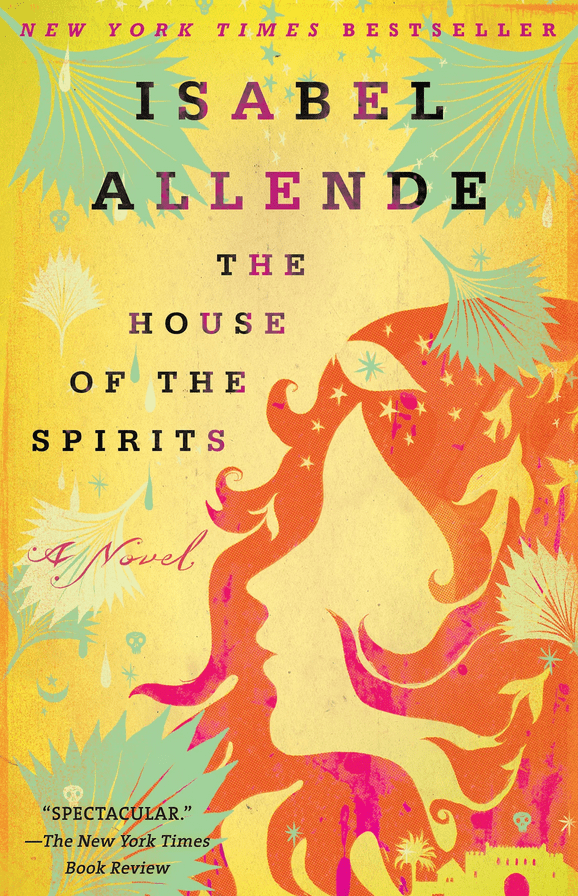
July’s Book Discussion read was Chilean author Isabel Allende’s debut novel The House of the Spirits. Though the book neither directly names any historical figures nor specifies where it’s set, it’s widely recognized as a political and social allegory relating the circumstances leading up to the 1973 military coup in which Augusto Pinochet seized political power from Chile’s democratically elected president, Salvador Allende. President Allende was the first cousin of Isabel Allende’s father and the author was living and working in Chile at the time of the coup. She was forced to flee to Venezuela after helping targets of political assassination escape Chile. It was during this time of asylum that she wrote The House of the Spirits.
Pinochet’s reign was among a number of dictatorships that gripped Central and South American countries throughout the 20th Century. Beginning in the 1950s and extending throughout the 1980s tens of thousands of people deemed political subversives were kidnapped, tortured, and “disappeared” in brutal terror operations carried out by the intelligence arms of these regimes. Argentina’s so-called Dirty War is perhaps the best known of these campaigns as some estimates of its Disappeared are as high as 30,000, though this number has been disputed. In 1975 Chile, along with Argentina, Uruguay, Paraguay, Bolivia, and Brazil, formed Operation Condor, an intercountry, anti-communist political crackdown in which governments were toppled in a series of military coups; however, the regimes of Operation Condor were not the only Latin American dictatorships to have terrorized their citizens. There was Fidel Castro in Cuba, Rafael Trujillo in the Dominican Republic, the Somoza family in Nicaragua, Manuel Estrada Cabrera in Guatemala, Porfirio Diaz in Mexico, and others.
The cultural impact these tyrannies had on the societies they hijacked has wrought a genre of literature called the dictator novel. The rise of the dictator novel coincides with the modernist literary movement known as the Latin American Boom in the 1960s and 70s, though there exist much earlier works that would also fall into this category. In order to be considered a dictator novel most literary critics agree that the protagonist is the dictator, and that the novel should contain themes of power and identity, particularly gender as it relates to machismo. The works are psychologically driven, yet contain political leitmotifs honed to challenge dictatorial authority.
There are also many works closely related to the dictator novel that focus less on the dictator as the main subject, but rather examine the effect of how living under such extreme and violent circumstances affects a society and the individuals within it. The House of the Spirits falls into this category as the reader is never privy to the inner psychological workings of the unnamed dictator. Rather, Allende uses magical realism, another literary style linked to the Boom writers and commonly used in political allegories, to underscore subversive political themes in The House of the Spirits.
Reading list of dictator novels and adjacent fiction available at the Laramie County Library:
Mr. President by Miguel Angel Asturias
The general in his labyrinth by Gabriel Garcia Marquez
Dreaming in Cuban by Cristina Garcia
In the time of the butterflies by Julia Alvarez
On a night of a thousand stars by Andrea Yaryura Clark
Harsh times by Mario Vargas Llosa
Of love and shadows by Isabel Allende
Space invaders: a novel by Nona Fernandez
The blue line: a novel (online) by Ingrid Betancourt
The brief wondrous life of Oscar Wao by Junot Diaz
Nonfiction titles related to Latin American dictatorships:
Pinochet and me: a Chilean anti-memoir by Marc Cooper
Bad Mexicans: race, empire, and revolution in the borderlands by Kelly Lytle Hernandez
Perilous partners: the benefits and pitfalls of America’s alliances with authoritarian regimes (contains a chapter specifically discussing “friendly Latin American Strongmen”) by Ted Galen Carpenter
Che: a memoir by Fidel Castro
Fidel Castro: my life: a spoken memoir by Fidel Castro
Hunting Che: how a U.S. special forces team helped capture the world’s most famous revolutionary by Mitch Weiss
CIA activities in Chile (available online)
Cuba libre!: Che, Fidel, and the improbable revolution that changed world history by Tony Perrottet
Oranda Davis
Reference Librarian
